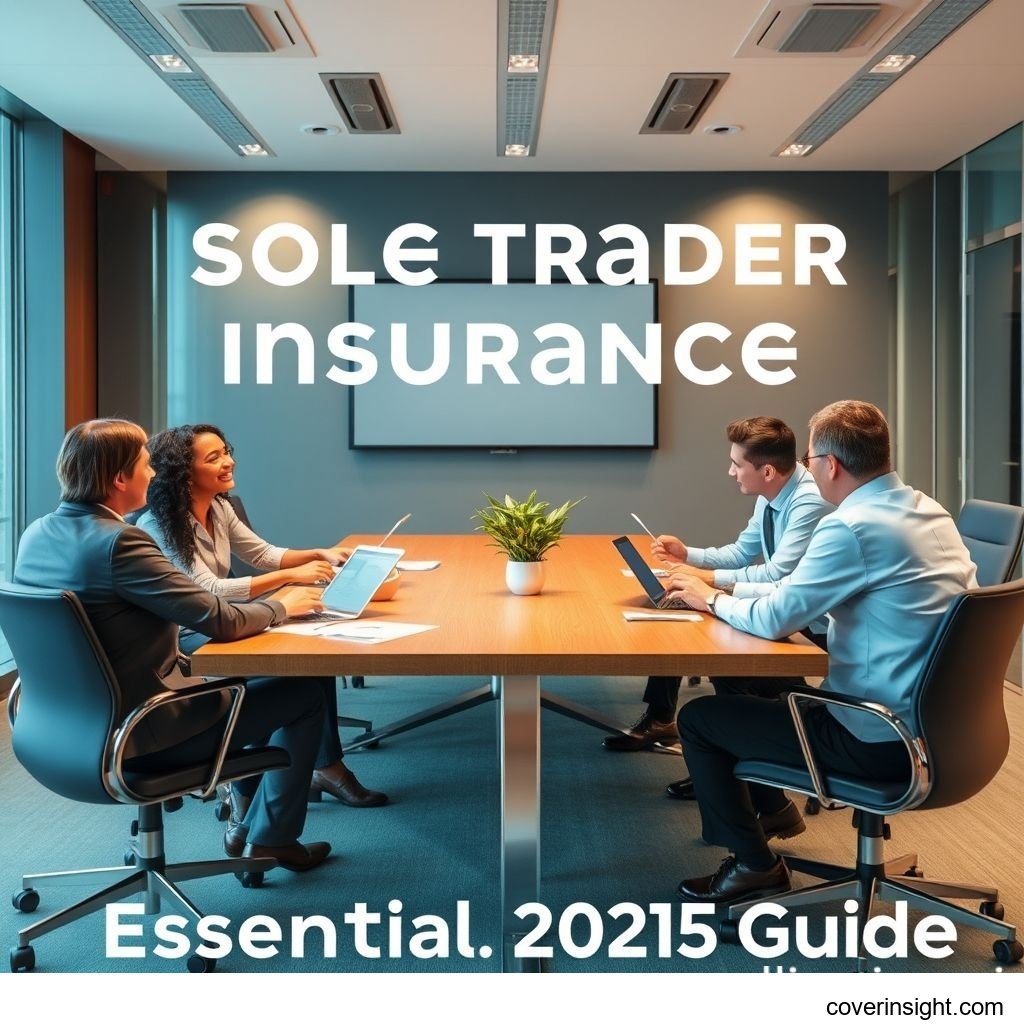Sole Trader Insurance AU: Essential 2025 Guide
Introduction
As Australia's dynamic business landscape continues to evolve in 2025, the importance of robust protection for sole traders cannot be overstated. Navigating the unique challenges and opportunities of independent operation requires not just skill and determination, but also foresight. One critical aspect of this foresight is securing comprehensive business insurance. Specifically, understanding the nuances of aig business insurance offerings in Australia is paramount for sole traders seeking to safeguard their ventures against unforeseen risks. This guide will delve into the essential aspects of sole trader insurance, highlighting how AIG's solutions can provide crucial peace of mind and financial security for your business in the year ahead.
Why Sole Traders Need Protection
Operating as a sole trader offers unparalleled freedom and flexibility, but it also means shouldering all the associated risks personally. Without adequate protection, a single mishap, client dispute, or unforeseen event could jeopardise your personal assets and the future of your business. Proactive risk management, including the right insurance, is not just a safeguard; it's a strategic business decision.
Navigating Business Risks
Sole traders face a diverse array of potential risks that can impact their operations and financial stability. These can range from minor incidents to catastrophic events, each demanding a specific type of coverage. Common risks include:
-
Public liability claims: A client or member of the public suffers an injury or property damage due to your business activities.
-
Professional negligence: Your advice or service causes financial loss to a client.
-
Property damage: Your equipment or business premises are damaged by fire, theft, or natural disasters.
-
Cyber threats: Data breaches or cyberattacks compromise client information or disrupt your operations.
-
Contractual disputes: Legal costs arising from disagreements with clients or suppliers.
Understanding these vulnerabilities is the first step in identifying the appropriate sole trader insurance solutions for your specific industry and operational footprint.
Peace of Mind and Compliance
Beyond financial protection, having the right insurance provides immense peace of mind, allowing you to focus on growing your business rather than worrying about potential liabilities. Furthermore, certain industries or client contracts may legally require specific types of coverage. Ensuring compliance not only protects you legally but also enhances your credibility and trustworthiness in the market. Many tenders or contracts, especially with larger organisations, will mandate that you hold a minimum level of public liability or professional indemnity insurance.
Coverage Details
Securing comprehensive aig business insurance involves understanding the various types of coverage available and how they apply to a sole trader's unique circumstances. A tailored policy ensures you're protected where it matters most, without paying for unnecessary coverages.
What’s Included
A typical aig business insurance package for sole traders in Australia often includes a combination of the following key policies:
-
Public Liability Insurance: Essential for any business interacting with the public. It covers legal costs and compensation payable if a third party is injured or their property is damaged as a result of your business activities. For example, if a client trips over your equipment at a shared office space.
-
Professional Indemnity Insurance: Critical for professionals offering advice or services (e.g., consultants, designers, IT professionals). This covers claims arising from negligence, errors, or omissions in your professional service that cause financial loss to a client.
-
Product Liability Insurance: If you manufacture, sell, or supply products, this protects you against claims for injury or damage caused by those products.
-
Cyber Insurance: As businesses become increasingly digital, this covers costs associated with data breaches, cyberattacks, and network interruptions, including notification costs, forensic investigation, and reputational damage control.
-
Business Pack / Property Insurance: While sole traders might not have extensive premises, this can cover essential business equipment (laptops, tools, machinery) against theft, damage, or loss, whether at your home office or on client sites.
-
Personal Accident and Illness Insurance: While not strictly business insurance, many sole traders opt for this to protect their income if they're unable to work due to injury or illness, as they don't have access to sick leave benefits.
Common Exclusions
While aig business insurance offers broad protection, it’s equally important to be aware of what is typically not covered. Exclusions vary between policies and insurers, but generally include:
-
Intentional acts or fraud: Deliberate harm or illegal activities.
-
Pre-existing conditions: Issues known prior to policy inception.
-
Acts of war or terrorism: Damage or loss resulting from such events.
-
Losses from uninsured perils: Damage caused by events not specifically listed in your policy (e.g., a specific type of flood if not covered by your property policy).
-
Fines and penalties: Non-insurable by law.
-
Contractual liabilities: Unless specifically assumed and covered within the policy wording.
-
Employee-related claims: Sole traders typically don't have employees, but if you engage contractors, specific coverages might be needed. Workers' compensation is for employees and is a separate obligation.
Always read your Policy Disclosure Statement (PDS) carefully to understand the full scope of your coverage and any specific exclusions.
Tailoring Your AIG Business Insurance Policy
One of the key advantages of aig business insurance for sole traders is the flexibility to customise your policy. Instead of a one-size-fits-all approach, you can select specific modules that align with your unique business risks.
Steps to tailor your policy include:
-
Assess your risks: Identify what could go wrong in your specific industry. A freelance graphic designer's risks differ from a mobile mechanic's.
-
Determine coverage limits: How much protection do you realistically need for each risk? Consider your turnover, assets, and potential liability.
-
Review existing contracts: Do any client contracts mandate specific insurance types or minimum coverage amounts?
-
Consult with an expert: An insurance broker specialising in sole trader insurance can provide invaluable advice on structuring your policy.
Directors' Liability Coverage and Sole Traders
While directors' liability coverage (often referred to as Directors & Officers (D&O) insurance) is typically associated with companies that have a formal board of directors, its relevance to sole traders can be nuanced. Pure sole traders generally operate without a separate legal entity, meaning their personal liability is often direct and unlimited. However, understanding its principles is crucial, especially for sole traders who might be:
-
Considering incorporating in the future.
-
Serving on advisory boards for other businesses.
-
Engaging in joint ventures or partnerships where roles may blur.
When Directors' Liability Applies
For a traditional sole trader, directors' liability coverage in its common form does not directly apply, as there is no separate legal entity or board of directors. Your liability is typically covered under your professional indemnity or public liability policies. However, scenarios where it might indirectly become relevant or where its principles are important to understand include:
-
Future Business Evolution: If you plan to transition from a sole trader to a proprietary limited company (Pty Ltd), D&O insurance becomes a critical consideration for protecting you as a director from claims of wrongful acts, breach of duty, or mismanagement.
-
Advisory Roles: If you, as a sole trader, accept a position on an advisory board or a non-executive directorship for another entity, you would then have director-level responsibilities and potential liabilities, making D&O insurance for that role essential.
-
Specific Contractual Requirements: In rare cases, some large clients might require individual contractors (even sole traders) to demonstrate a broader scope of protection if they are deemed to have significant decision-making power that impacts the client’s operations.
It is important to discuss your specific operational structure and future plans with an aig business insurance specialist to determine the most appropriate coverages.
Protecting Your Personal Assets
One of the fundamental reasons for securing comprehensive sole trader insurance is to protect your personal assets. As a sole trader, there's no legal separation between you and your business. This means your personal wealth (home, savings, car) is generally at risk if your business incurs significant liabilities not covered by insurance. While directors' liability coverage protects directors of companies from claims against their personal assets for decisions made in their directorial capacity, for sole traders, it's the broader professional indemnity, public liability, and other business insurances that form this vital protective barrier. These policies assume the financial burden of covered claims, shielding your personal finances from potentially crippling legal costs and compensation payouts.
Cost Analysis
Understanding the cost of aig business insurance is crucial for budgeting and securing appropriate protection without overspending. Premiums are not fixed and depend on a variety of factors unique to your business.
Price Factors
Several elements influence the premium you will pay for aig business insurance:
-
Industry and Business Type: High-risk industries (e.g., construction, high-tech IT) generally face higher premiums due to increased potential for claims.
-
Coverage Limits and Deductibles/Excesses: Higher coverage amounts mean higher premiums. Conversely, opting for a higher excess (the amount you pay upfront per claim) can reduce your premium.
-
Business Turnover/Revenue: A higher turnover can indicate a larger scale of operations and potentially greater exposure to risk, leading to higher premiums.
-
Claims History: Businesses with a history of claims may face higher premiums than those with a clean record.
-
Location: Operating in areas with higher crime rates or specific environmental risks (e.g., flood zones) can influence property-related premiums.
-
Years in Business: Established businesses might sometimes get better rates due to a proven track record of stability.
Saving Tips
While you can't control all factors, there are several strategies sole traders can employ to potentially reduce their sole trader insurance premiums:
-
Bundle Policies: Insurers often offer discounts when you purchase multiple policies (e.g., public liability and professional indemnity) as a package.
-
Increase Your Excess: Opting for a higher excess means you'll pay more out-of-pocket if you make a claim, but your annual premium will be lower.
-
Implement Risk Management: Demonstrate proactive risk management practices (e.g., clear safety protocols, robust cybersecurity measures) to your insurer. This can sometimes lead to reduced premiums.
-
Review Your Coverage Annually: Your business needs change. Don't pay for coverage you no longer require. Annually assess if your existing policy still aligns with your current operations.
-
Maintain a Clean Claims Record: Avoiding claims through good business practices can help keep your premiums competitive over the long term.
-
Shop Around: While this guide focuses on aig business insurance, it's always wise to compare quotes from various reputable insurers to ensure you're getting the best value for your specific needs.
Understanding Your AIG Business Insurance Quote
When you receive a quote for aig business insurance, it's more than just a number. Take the time to understand its components:
-
Policy Schedule: This lists the insured party, period of insurance, type of cover, sum insured, and applicable excesses.
-
Premium Breakdown: Clearly shows the cost for each type of coverage.
-
Policy Wording/PDS: This is the detailed legal document outlining exactly what is covered, what is excluded, and your obligations. It's crucial for managing expectations and avoiding surprises later.
-
Duty of Disclosure: Be honest and accurate with all information provided, as misrepresentation can invalidate your policy.
Choosing the Right AIG Business Insurance Policy
Selecting the right aig business insurance for your sole trader venture involves a thoughtful process that considers your current operations, future aspirations, and specific risk profile. It's about finding the sweet spot between comprehensive protection and cost-effectiveness.
Steps to Secure Coverage
Follow these steps to confidently secure your sole trader insurance:
-
Assess Your Specific Needs:
-
What industry are you in?
-
What services/products do you offer?
-
Do you interact with clients/public physically?
-
Do you handle sensitive data?
-
What assets do you rely on?
-
-
Determine Coverage Levels: Based on your assessment, decide on appropriate liability limits for each type of insurance.
-
Request Quotes: Contact AIG directly or work with an insurance broker who can provide tailored quotes for aig business insurance.
-
Compare and Customise: Don't just look at the price. Compare the inclusions, exclusions, excesses, and overall value. Work with your provider to customise a package that truly fits your needs.
-
Read the Product Disclosure Statement (PDS): This cannot be stressed enough. The PDS is the authoritative document detailing the terms and conditions of your policy.
-
Finalise and Renew: Once satisfied, purchase your policy. Remember to review it annually or when your business significantly changes.
Future-Proofing Your Sole Trader Business
Your aig business insurance policy shouldn't be a set-and-forget item. As your sole trader business evolves, so too will your insurance requirements. Regular reviews are essential to ensure your coverage remains relevant and adequate. Consider these factors for future-proofing:
-
Growth and Expansion: Are you taking on larger projects, new types of clients, or expanding into new service areas? This might require increased coverage limits or new types of policies.
-
Technological Changes: The adoption of new technologies might introduce new cyber risks or alter your liability profile.
-
Regulatory Changes: Staying abreast of Australian regulatory changes (e.g., privacy laws, industry-specific licensing) can impact your insurance needs.
-
Asset Acquisition: Purchasing new valuable equipment or premises means reassessing your asset protection.
A proactive approach to your sole trader insurance ensures that your business remains resilient and protected against the evolving landscape of 2025 and beyond.
FAQs
How much does aig business insurance cost?
The cost of aig business insurance varies significantly based on factors like your industry, business type, annual turnover, the specific types of coverage selected (e.g., public liability, professional indemnity), the chosen coverage limits, and your claims history. It's best to obtain a personalised quote to get an accurate figure.
What affects premiums?
Premiums are influenced by your business's inherent risk level (industry, services), the sum insured for each policy type, the excess you choose, your claims history, and potentially your business's size (turnover). Location and specific operational details can also play a role.
Is it mandatory?
While no single "sole trader insurance" policy is universally mandatory by law across all Australian industries, specific types of insurance often are. For instance, if you have employees, Workers' Compensation insurance is generally mandatory. Public Liability insurance is often required by clients, landlords, or local councils. Professional Indemnity may be mandated by professional bodies. It’s crucial to check your industry's specific requirements and any contractual obligations.
How to choose?
Choosing the right aig business insurance involves assessing your specific business risks, understanding the different types of coverage (e.g., Public Liability, Professional Indemnity, Cyber), determining appropriate coverage limits, and comparing quotes. Consulting with an experienced insurance broker specialising in sole trader insurance can greatly assist in tailoring a policy to your unique needs.
Consequences of no coverage?
Operating without adequate insurance can have severe financial consequences. You would be personally liable for any legal costs, compensation payouts, or damages arising from claims against your business. This could lead to significant financial loss, potentially forcing you to sell personal assets, and in the worst case, lead to bankruptcy, effectively ending your business.
Note: As an AI, I cannot generate images or their alt texts. Please ensure you add relevant images with descriptive alt texts for keywords like 'aig business insurance' during content publishing.
Internal Links:
-
For more detailed insights, explore our Insurance Resources Global.
-
For a broader view of the Australian insurance market, visit our AU Insurance Home page.
External Links:
-
For regulatory information on the Australian financial industry, consult the Australian Prudential Regulation Authority.
-
For general information about insurance in Australia, refer to the Insurance Council of Australia.







Comments